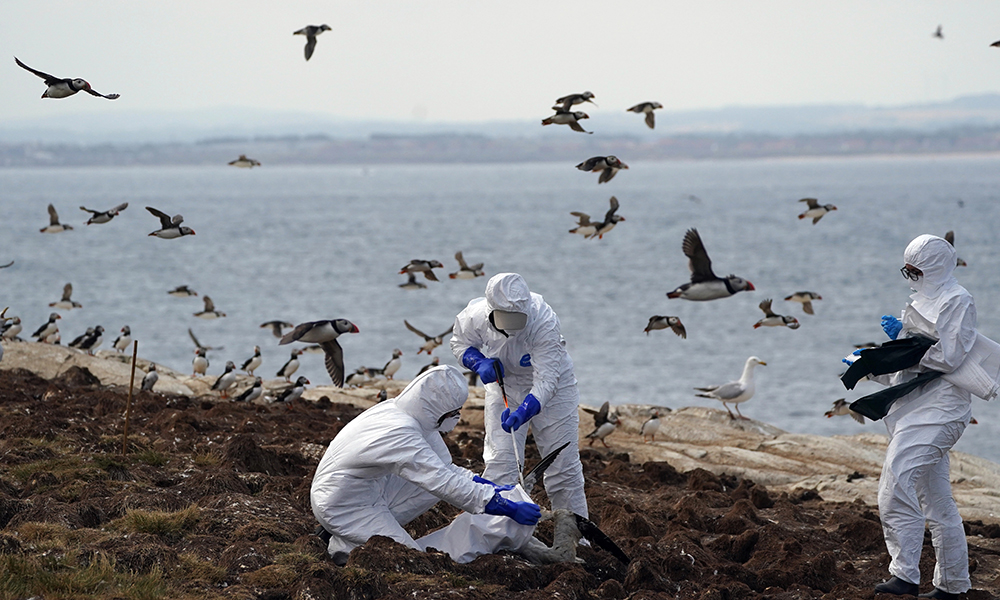
今年有近5,300萬(wàn)只鳥類死于禽流感,是美國(guó)歷史上最嚴(yán)重的一次禽流感疫情,導(dǎo)致節(jié)日用火雞嚴(yán)重短缺。
美國(guó)農(nóng)業(yè)部(U.S. Department of Agriculture)在11月29日的一份報(bào)告中表示,自今年1月以來(lái),46個(gè)州的5,248萬(wàn)只鳥類因?yàn)椴《颈旧砘虮粴⑺酪远糁苽魅酒渌B類而死亡。根據(jù)聯(lián)邦數(shù)據(jù),絕大多數(shù)是家禽,盡管也有數(shù)千只野生鳥類。
在今年之前,美國(guó)歷史上最大的禽流感疫情于2015年爆發(fā),當(dāng)時(shí)美國(guó)農(nóng)業(yè)部稱之為“可以說(shuō)是美國(guó)歷史上最重要的動(dòng)物健康事件”。
那一年,21個(gè)州的5,050萬(wàn)只鳥類死于H5N2和H5N8毒株,這些毒株被美國(guó)疾病控制和預(yù)防中心(Centers for Disease Control and Prevention)認(rèn)定為“高致病性”禽流感(HPAIs)。今年影響鳥類的H5N1毒株也被認(rèn)為是高致病性禽流感。自1月以來(lái),在野生水鳥、商品家禽、后院家禽和業(yè)余養(yǎng)殖禽群中發(fā)現(xiàn)了這種病毒。
已知一些類似于H5N1的高致病性禽流感會(huì)損害鳥類的多個(gè)器官,并且能夠?qū)е?0%至100%感染高致病性禽流感的雞死亡。好消息是:據(jù)美國(guó)疾病控制和預(yù)防中心稱,目前流行的H5N1毒株被認(rèn)為對(duì)人類構(gòu)成的風(fēng)險(xiǎn)很小,今年迄今為止只報(bào)告了一例人類感染禽流感的病例。據(jù)世界衛(wèi)生組織(World Health Organization)稱,這名患者是科羅拉多州的一名家禽農(nóng)場(chǎng)工人,在醫(yī)院外接受了抗病毒藥物治療,只出現(xiàn)了疲勞的癥狀。
禽流感以前曾經(jīng)在人類身上引起從輕微到嚴(yán)重的一系列疾病。因此,美國(guó)疾病控制和預(yù)防中心敦促人們?cè)诠ぷ骱图依锱c鳥類接觸時(shí)要謹(jǐn)慎。為避免感染禽流感或?qū)⑵鋫鞑ソo其他鳥類或動(dòng)物,例如寵物,該機(jī)構(gòu)建議人們:
·盡可能避免直接接觸野生鳥類。
·要意識(shí)到,攜帶禽流感病毒的鳥類不一定有發(fā)病癥狀。
·在沒(méi)有穿戴防護(hù)用品的情況下,不要接觸看起來(lái)生病或死亡的鳥類。
·不要接觸可能含有任何種類鳥類的唾液、粘液或糞便的表面,無(wú)論是野生的還是家養(yǎng)的,如果你接觸了這些表面,一定不要觸摸你的眼睛、鼻子或嘴巴。
·接觸鳥類后要洗手。
·如果你從事鳥類相關(guān)職業(yè),請(qǐng)使用手套、N95呼吸器或更貼合面部的口罩和護(hù)目鏡等防護(hù)用品。
·在處理病禽和/或接觸野生鳥類后更換衣服。扔掉你的個(gè)人防護(hù)用品,用肥皂和水清洗雙手。
美國(guó)農(nóng)業(yè)部提醒消費(fèi)者,作為一般預(yù)防措施,需要將所有家禽和雞蛋煮至華氏165度(約73.89攝氏度)。(財(cái)富中文網(wǎng))
譯者:中慧言-王芳
今年有近5,300萬(wàn)只鳥類死于禽流感,是美國(guó)歷史上最嚴(yán)重的一次禽流感疫情,導(dǎo)致節(jié)日用火雞嚴(yán)重短缺。
美國(guó)農(nóng)業(yè)部(U.S. Department of Agriculture)在11月29日的一份報(bào)告中表示,自今年1月以來(lái),46個(gè)州的5,248萬(wàn)只鳥類因?yàn)椴《颈旧砘虮粴⑺酪远糁苽魅酒渌B類而死亡。根據(jù)聯(lián)邦數(shù)據(jù),絕大多數(shù)是家禽,盡管也有數(shù)千只野生鳥類。
在今年之前,美國(guó)歷史上最大的禽流感疫情于2015年爆發(fā),當(dāng)時(shí)美國(guó)農(nóng)業(yè)部稱之為“可以說(shuō)是美國(guó)歷史上最重要的動(dòng)物健康事件”。
那一年,21個(gè)州的5,050萬(wàn)只鳥類死于H5N2和H5N8毒株,這些毒株被美國(guó)疾病控制和預(yù)防中心(Centers for Disease Control and Prevention)認(rèn)定為“高致病性”禽流感(HPAIs)。今年影響鳥類的H5N1毒株也被認(rèn)為是高致病性禽流感。自1月以來(lái),在野生水鳥、商品家禽、后院家禽和業(yè)余養(yǎng)殖禽群中發(fā)現(xiàn)了這種病毒。
已知一些類似于H5N1的高致病性禽流感會(huì)損害鳥類的多個(gè)器官,并且能夠?qū)е?0%至100%感染高致病性禽流感的雞死亡。好消息是:據(jù)美國(guó)疾病控制和預(yù)防中心稱,目前流行的H5N1毒株被認(rèn)為對(duì)人類構(gòu)成的風(fēng)險(xiǎn)很小,今年迄今為止只報(bào)告了一例人類感染禽流感的病例。據(jù)世界衛(wèi)生組織(World Health Organization)稱,這名患者是科羅拉多州的一名家禽農(nóng)場(chǎng)工人,在醫(yī)院外接受了抗病毒藥物治療,只出現(xiàn)了疲勞的癥狀。
禽流感以前曾經(jīng)在人類身上引起從輕微到嚴(yán)重的一系列疾病。因此,美國(guó)疾病控制和預(yù)防中心敦促人們?cè)诠ぷ骱图依锱c鳥類接觸時(shí)要謹(jǐn)慎。為避免感染禽流感或?qū)⑵鋫鞑ソo其他鳥類或動(dòng)物,例如寵物,該機(jī)構(gòu)建議人們:
·盡可能避免直接接觸野生鳥類。
·要意識(shí)到,攜帶禽流感病毒的鳥類不一定有發(fā)病癥狀。
·在沒(méi)有穿戴防護(hù)用品的情況下,不要接觸看起來(lái)生病或死亡的鳥類。
·不要接觸可能含有任何種類鳥類的唾液、粘液或糞便的表面,無(wú)論是野生的還是家養(yǎng)的,如果你接觸了這些表面,一定不要觸摸你的眼睛、鼻子或嘴巴。
·接觸鳥類后要洗手。
·如果你從事鳥類相關(guān)職業(yè),請(qǐng)使用手套、N95呼吸器或更貼合面部的口罩和護(hù)目鏡等防護(hù)用品。
·在處理病禽和/或接觸野生鳥類后更換衣服。扔掉你的個(gè)人防護(hù)用品,用肥皂和水清洗雙手。
美國(guó)農(nóng)業(yè)部提醒消費(fèi)者,作為一般預(yù)防措施,需要將所有家禽和雞蛋煮至華氏165度(約73.89攝氏度)。(財(cái)富中文網(wǎng))
譯者:中慧言-王芳
Nearly 53 million U.S. birds have died this year due to avian flu, marking the worst outbreak in national history and fueling the holiday turkey shortage.
Since January, 52.48 million birds in 46 states have died because of the virus itself or because they were killed to curb exposure of other birds, the U.S. Department of Agriculture said in a November 29 report. The vast majority were poultry, though several thousand were wild birds, according to?federal data.
Prior to this year, the largest bird flu outbreak in U.S. history occurred in 2015, in what the USDA at the time called “arguably the most significant animal health event in U.S. history.”
That year, 50.5 million birds in 21 states died due to strains H5N2 and H5N8, deemed “highly pathogenic” avian influenzas (HPAIs) by the U.S. Centers for Disease Control and Prevention. The strain affecting birds this year, H5N1, is also considered an HPAI. Since January, it’s been detected in wild aquatic birds, commercial poultry, and backyard and hobby flocks.
Some HPAIs similar to H5N1 are known to damage multiple organs and kill from 90% to 100% of chickens they infect. The good news: The H5N1 strain currently circulating is thought to pose little risk to humans, and only one human case has been reported so far this year, according to the CDC. The patient, a poultry farm worker in Colorado, was treated with antivirals outside of the hospital and suffered only fatigue, according to the World Health Organization.
The bird flu has caused a range of illnesses in humans before, from mild to severe. Thus, the CDC urges caution when interacting with birds, both at work and at home. To avoid contracting the bird flu or spreading it to other birds or animals like pets, the agency recommends that people:
·Avoid direct contact with wild birds when possible.
·Realize that birds don’t have to look sick to carry bird flu.
·Don’t touch birds that look sick, or dead birds, without wearing protective equipment.
·Don’t touch surfaces that might have saliva, mucus, or feces from any type of bird, wild or domestic, and certainly don’t touch your eyes, nose, or mouth if you do touch such surfaces.
·Wash your hands after touching birds.
·Use protective equipment like gloves, an N95 respirator or a well-fitting face mask, and eye protection, if you work with birds.
·Change your clothes after working with sick poultry and/or after handling wild birds. Throw away your PPE and wash your hands with soap and water.
The USDA reminds consumers to cook all poultry and eggs to an internal temperature of 165?F as a general precaution.






